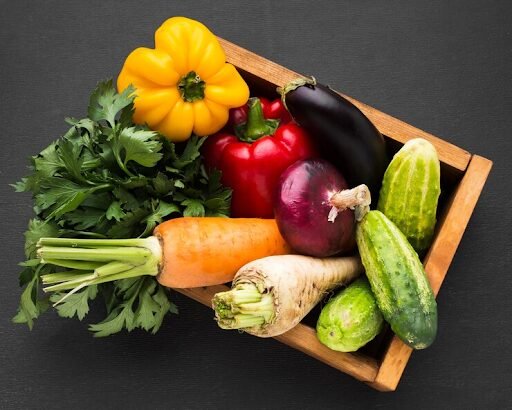Today, there is a growing surge in the demand for organic farm produce as customers become increasingly health and environmentally conscious. But what distinguishes organic fruits and vegetables from their non-organic counterparts? Is this a fad, or are there advantages to making organic choices?
This article explains in detail five important ways organic produce stands out from non-organic options. It will shed light on the health, environmental, and community benefits organic products offer.
1. Health Benefits
Organic produce is popularly known for its health benefits. However, the most significant is understanding the difference between organic and non-organic, which will help you make an informed and health-wise decision.
Usually, organic products have many health benefits, including fruits and vegetables, which supply higher nutrients than traditional fruits and vegetables grown without chemicals.
This section discusses the health benefits of choosing organic foods by showing how their improved quality can advance human health.
Nutrient Content
Many people go after organic produce due to the possibility of their nutrient content. Several research studies show that organic fruits and vegetables have more vitamins, minerals, and antioxidant content when compared to conventionally grown products. For example, organic tomatoes contain vitamin C and other phytochemically active compounds.
Absence of Harmful Chemicals
Organic foods are grown without any synthetic pesticides, herbicides, and fertilizers, usually used for conventional farming. Research shows that such chemicals remain in fruits and vegetables due to their inherent properties. Unfortunately, you’re often a consumer of them.
Overexposure to such chemicals results in disruption of hormones, neurological problems, and, in extreme cases, cancer. Therefore, eating organic food reduces these conditions because it’s free from synthetic chemical residues.
Organic farming methods emphasize soil and plant nutrition and minimal use of synthetic fertilizers.
2. Ecological Impacts
Apart from the health benefits, organic farming also protects the environment. Here is how its practices contribute to environmental sustainability and their long-term benefits.
Sustainable Farming Techniques
Organic farming is ecological. It explores different sustainable methods, such as crop rotation, composting, and using manure, to make nutrients available to the soil, where they access natural fertilizers. This helps in soil conditioning and fertility and eliminates the necessity for chemical fertilizers.
Due to healthy soil, organic farmers can grow vigorous plants with a high tolerance to pests and diseases. Thus, during harvest, the crops from the farm are more nutritious and free from pollution and soil degradation in contrast to conventional farming.
Biodiversity
Another critical environmental benefit of organic farming is its support for biodiversity.
Organic farms possess a larger number of plants and animals than conventional farms. Such diversity is a key to healthy ecosystems in that it supports natural predators controlling pests and pollination. All these accomplish the balanced ecosystem that makes organic farming more sustainable and reduces the need for synthetic chemicals.
3. Flavor and Quality
Studies show that organic fruits and vegetables taste better because they have more intense and complex flavors. Most consumers who have tried organic produce concur with the same findings. They claim that organic produce tastes much better and is of higher quality than the non-organic type. This taste links to the planting process since organic plants reach their full flavor potential. A few examples are the recent discoveries that organic strawberries and carrots are much sweeter and more flavorful than their non-organic counterparts.
Organic produce tastes fresher because organic farms are often smaller and more inclined to sell to localized markets, shortening the time between harvest and your plate. Due to freshness, you eat fruits and vegetables at their prime, making them tasty and nutritious.
4. Trust and Transparency
The production of organic products is done under very strict guidelines. At times, they are under stringent certification standards in their production, which include the making of synthetic pesticides, genetically modified organisms (GMOs), and artificial fertilizers. The USDA Organic label is an example of organic produce that meets these very stringent requirements in the United States.
Through this certification, consumers can ensure that what they purchase as food is genuinely organic and produced using environmentally friendly practices.
In addition, the organic label often provides transparency, which is lacking in the case of conventional produce. Generally, organic farming worldwide is more open for people; perhaps quite a number open their doors if the public is interested.
This transparency is critical to developing trust between farmers and the public, and it gives you peace of mind knowing the food is grown safely and sustainably.
5. Support for Local Farmers
When you buy organic, you support the local and small-scale farmers. Mostly, those involved in an organic setting are family-run and family-owned farms, and the customer base on their produce helps circulate the money within the local setting.
The support given to small farms helps sustain local economies and secure prosperity for the future. As a consumer, going organic secures economic well-being for your community.
Moreover, purchasing such organic foods creates a personal connection to those who produce your food. Farmers’ markets, CSA programs, and farm stands give consumers direct contact with the sources of their foods. Therefore, you can learn more about farming practices, ask questions, and become familiar with the types of food grown.
Conclusion
Some crucial points to make the case that organic produce is better than non-organic produce include its benefits: a better health profile, a positive environmental impact, and better taste and quality. It also gives meaning and depth to taking up organic through the support available to local farmers and their respective communities, safety, and transparency by organic certification.
The more aware you become of these benefits, the higher your demand for organic produce will be, moving toward more conscious and sustainable approaches for the perfect food on your plates. Organic choices let the palate dance with the ability to furnish it with delicious, healthful foods while marking a healthier planet and supporting local economies.
